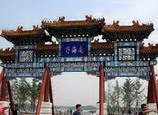
"The level of dust concentration emitted by coal-burning boilers in thermal power plants has been reduced from 30 milligrams per cubic meter to the strictest in the world — 20 milligrams per cubic meter," he said.
The State Council also asked local governments to enact emergency management response measures during periods of heavy pollution, such as restricting traffic flow or placing emissions limits on polluting industries.
"This is an important signal sent by the State government, calling for all levels of governmental officials to treat heavy pollution as seriously as severe natural disasters like earthquakes," Chai said.
He added that an emergency plan in response to heavy air pollution has been raised to national level, rather than simply being a spontaneous policy of local governments.
Another measure that illustrates the government's determination to control air pollution is the emphasis placed on strengthening the implementation of the environmental impact assessment system.
Under this measure, no loans should be provided to projects that haven't passed the assessment, and no electricity or water should be offered to such projects.
Other measures confirmed include mandatory disclosure of environmental information by heavy-polluting industries and enterprises, tougher fines for illegal behavior, and cooperation between regions and large cities.
 |
















 Developer razes historic Guangzhou structures
Developer razes historic Guangzhou structures


![]()
